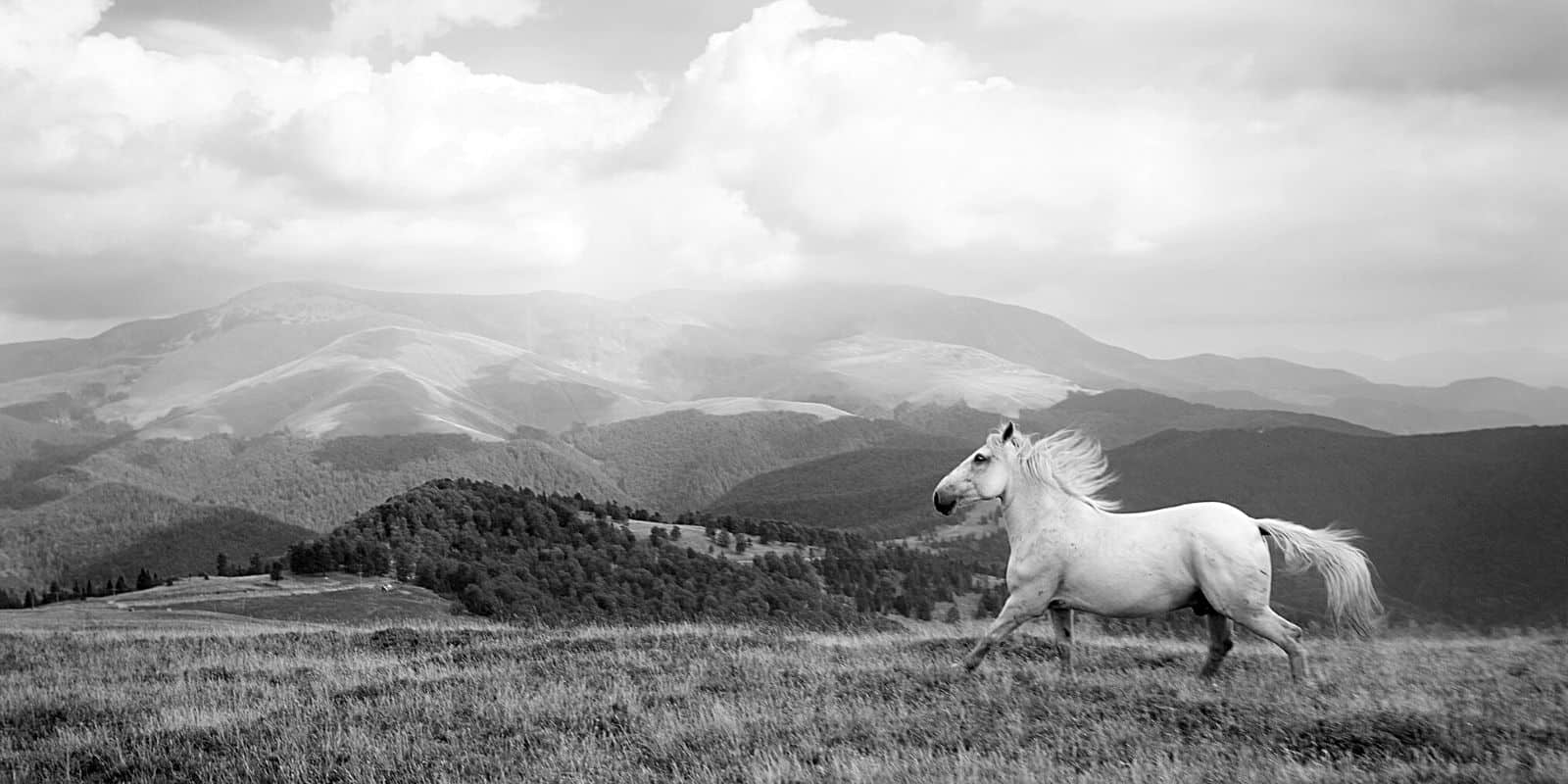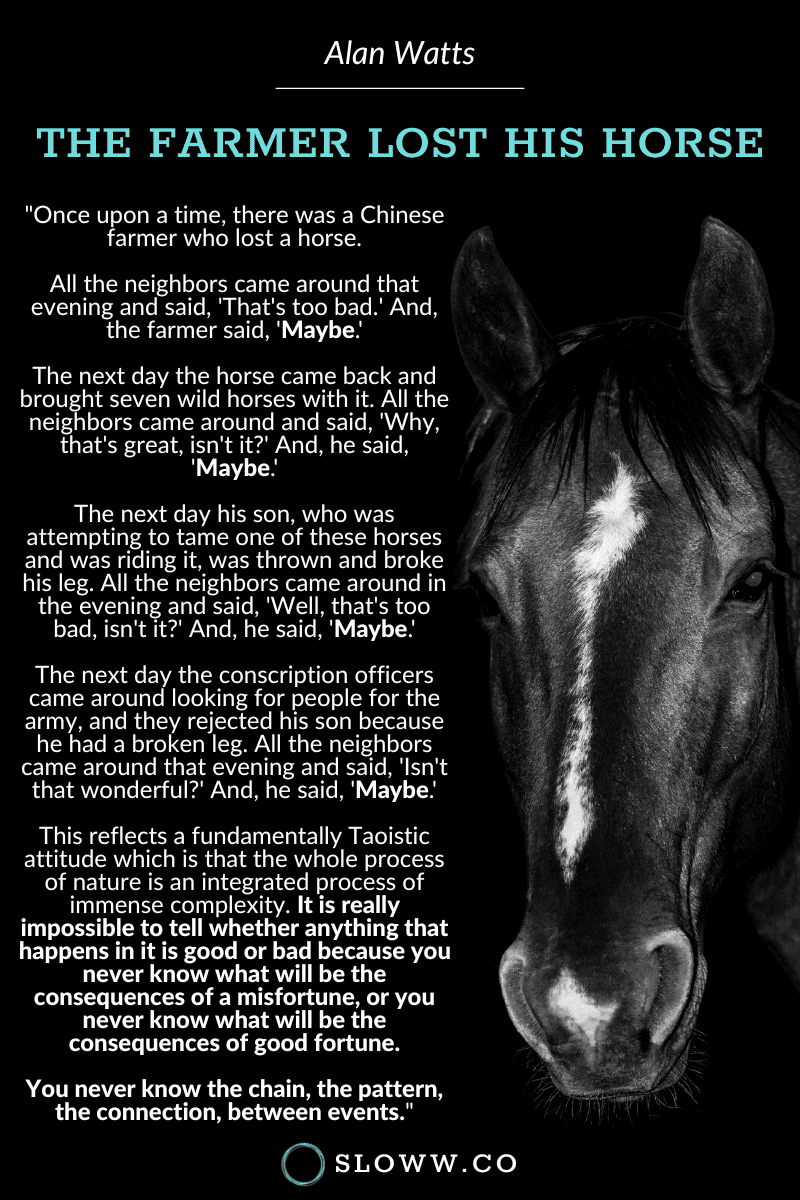The parable of the farmer and the lost horse (or Chinese farmer, Taoist farmer, etc) is believed to have originated in the Huainanzi, an ancient Chinese text dated to the 2nd century B.C.
It has been referred to by a variety of names over the years:
- The old man lost his horse
- The old man lost his horse, but it all turned out for the best
- The old man on the frontier lost his horse, how to know if this is fortuitous or not?
- Bad luck? Good luck? Who knows?
- Bad luck brings good luck, and good luck brings bad luck
Post Contents: Click a link to jump to a section below

The Parable of the Farmer who Lost his Horse: Lessons on Luck, Non-Judgment, & Interconnectedness
3 Versions of the Farmer who Lost his Horse
Essential Huainanzi Version:
“At the near frontier, there was a (family of) skilled diviners whose horse suddenly became lost out among the Hu (people). Everyone consoled them. The father said, ‘This will quickly turn to good fortune!’
After several months, the horse returned with a fine Hu steed. Everyone congratulated them. The father said, ‘This will quickly turn to calamity!’
The household was (now) replete with good horses; the son loved to ride, (but) he fell and broke his leg. Everyone consoled them. The father said, ‘This will quickly turn to good fortune!’
After one year, the Hu people entered the frontier in force; the able and strong all stretched their bowstrings and fought. Among the people of the near frontier, nine out of ten died. It was only because of lameness that father and son protected each other.”
Alan Watts Version:
“Once upon a time, there was a Chinese farmer who lost a horse. All the neighbors came around that evening and said, ‘That’s too bad.’ And, the farmer said, ‘Maybe.’
The next day the horse came back and brought seven wild horses with it. All the neighbors came around and said, ‘Why, that’s great, isn’t it?’ And, he said, ‘Maybe.’
The next day his son, who was attempting to tame one of these horses and was riding it, was thrown and broke his leg. All the neighbors came around in the evening and said, ‘Well, that’s too bad, isn’t it?’ And, he said, ‘Maybe.’
The next day the conscription officers came around looking for people for the army, and they rejected his son because he had a broken leg. All the neighbors came around that evening and said, ‘Isn’t that wonderful?’ And, he said, ‘Maybe.'”

Eckhart Tolle Version:
“This is illustrated in the story of a wise man who won an expensive car in a lottery. His family and friends were very happy for him and came to celebrate. ‘Isn’t it great!’ they said. ‘You are so lucky.’ The man smiled and said ‘Maybe.’
For a few weeks he enjoyed driving the car. Then one day a drunken driver crashed into his new car at an intersection and he ended up in the hospital, with multiple injuries. His family and friends came to see him and said, ‘That was really unfortunate.’ Again the man smiled and said, ‘Maybe.’
While he was still in the hospital, one night there was a landslide and his house fell into the sea. Again his friends came the next day and said, ‘Weren’t you lucky to have been here in hospital.’ Again he said, ‘Maybe.'”
Morals of the Story
Everything is interconnected, and we can’t see all the prior causes or predict the future consequences. Instead of judging something as “good” or “bad,” accept it as it is.
- “Good luck and bad luck create each other, and it is difficult to foresee their change … Bad luck brings good luck, and good luck brings bad luck. This happens without end, and nobody can estimate it.”
- “Good fortune has its roots in disaster, and disaster lurks with good fortune. Who knows why these things happen, or when this cycle will end?”
The Essential Huainanzi (Amazon):
- “As for the revolutions and the mutual generation of calamity and good fortune, their alterations are difficult to perceive … Thus, good fortune becoming calamity, calamity becoming good fortune; their transformations are limitless, so profound they cannot be fathomed.”
- “This reflects a fundamentally Taoistic attitude which is that the whole process of nature is an integrated process of immense complexity. It is really impossible to tell whether anything that happens in it is good or bad because you never know what will be the consequences of a misfortune, or you never know what will be the consequences of good fortune … You never know the chain, the pattern, the connection, between events.”
- “Instead of judging what is, accept it and enter into conscious alignment with the higher order. It is impossible for the mind to understand what place or purpose a seemingly random event has in the tapestry of the whole.”
You May Also Enjoy:
- Browse all simple & short stories




